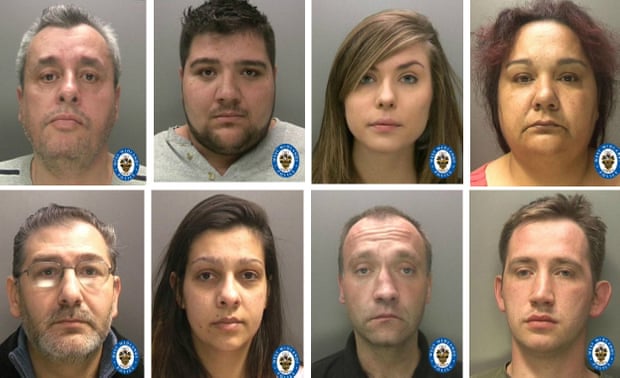Charity and police break up UK’s largest modern slavery ring
September 10, 2019 · By Ben Quinn for www.theguardian.com

Members of a Polish human traffickers gang, (top L-R) Ignacy Brzezinski, Jan Sadowski, Julianna Chodakowicz, Justyna Parczewska. (Bottom L-R_ Marek Brzezinski, Natalia Zmuda, Wojciech Nowakowski, Marek Chowaniec. Photograph: West Midlands police/EPA
The largest-ever modern slavery ring uncovered in the UK has been broken up after a three-year investigation into its activities. Some of its 400 victims worked for as little as 50p a day.
Their labour earned millions for members of a criminal gang led by a Polish criminal family, which preyed on the homeless, ex-prisoners and alcoholics from Poland. Gang members were jailed on Friday.
The gang tricked and then trafficked vulnerable men and women – ranging in age from 17 to over 60 – to Britain with the promise of gainful employment but instead housed them in squalor and used them as what a judge described as “commodities”.
Working on farms, rubbish recycling centres and poultry factories in the Midlands, they were made to live in cramped, rat-infested accommodation and reduced to going to soup kitchens and food banks to get enough to eat.
“Any lingering complacency after the 2007 bicentenary celebrations of the abolition of the English Slave Trade Act was misplaced,” Judge Mary Stacey told Birmingham crown court.
“The hard truth is that the practice continues, here in the UK, often hiding in plain sight.”
Reporting restrictions were lifted on Friday after the end of two trials of five men and three women, all originally from Poland, who have all now been convicted of modern slavery offences and money laundering.
Their conspiracy – which ran from June 2012 until October 2017 – was described by Stacey as the “most ambitious, extensive and prolific” modern day slavery network ever uncovered in Britain. Investigators believe it is the largest such criminal prosecution of its type in Europe to date.
An investigation was launched in February 2015 by West Midlands police after victims were identified by the anti-slavery charity Hope for Justice. Fifty-one victims eventually made contact after outreach efforts at two of the charity’s drop-in centres.
One victim, who was brought to the UK in 2014 after gang members approached him at a bus station with the promise of work in England after he had just been released from jail, said that being locked in a Polish prison was better than the conditions he was forced to endure.
Mirosław Lehmann, 38, originally from Poznan, said he had nowhere else to go and wanted to start a new life. After arriving, he and others experienced squalid living conditions, with up to four people to a room in homes dotted across the Black Country in the West Midlands.
He was forced to do housing renovation work, decorating, painting walls, clearing gardens and cutting grass, labouring for up to 13 hours at a time.
Any “pay” he may have earned was deducted by the gangmasters, who told him the cash had gone towards paying to bring him to the UK.
Brutality was commonplace and victims would in some cases be frogmarched to cashpoints to withdraw money and be told they owed debts for transport costs, rent and food.
When one worker died of natural causes at an address controlled by the gang, one of its leaders ordered his ID and personal effects be removed from his pockets before paramedics arrived.
Ignacy Brzezinski, one of several men convicted last month for their part in the ring, is currently on the run but was sentenced in his absence on Friday to 11 years.
“As the head of the family, he set the tone of the operation, and also enjoyed the fruits of the conspiracy, riding round in his Bentley and a fleet of high-performance cars at his disposal,” the judge said.
Another leading conspirator, Marek Chowanic, 30, was jailed for 11 years for trafficking, conspiracy to require another to perform forced labour and money laundering. Justyna Parczewska, 48, who was said by police to have played a “matriarchal role” by welcoming new arrivals, was given a five-and-a-half year sentence.
Marek Brzezinski, who made regular trips to north-east Poland to recruit workers, was jailed for nine years, Natalia Zmuda for four-and-a-half years and a recruitment consultant, Julianna Chodakiewicz, for five-and-a half years.
Wojciech Nowakowski, who was described as a one-time victim of the conspiracy who had risen to become a spy and enforcer for the gang, was jailed for six and a half years. Jan Sadowski – the only defendant to plead guilty – was given three years.
Ben Cooley, Hope for Justice’s chief executive, said: “While the victims can never get back what the traffickers took from them – financially, emotionally, physically and psychologically – we hope that the knowledge their abusers are now behind bars will help them as they move on with their lives.”
Many of the survivors who were supported by the charity are now in employment, including one who was able to bring his family over to live in the UK.
One man, who was a key witness in the trials, had been at risk of homelessness and was being sent debt letters for welfare benefits that had been fraudulently taken out by traffickers in his name. He is now living in a two-bedroom flat with his partner and child, works full-time to support his family and is no longer chased by bailiffs for debts.






